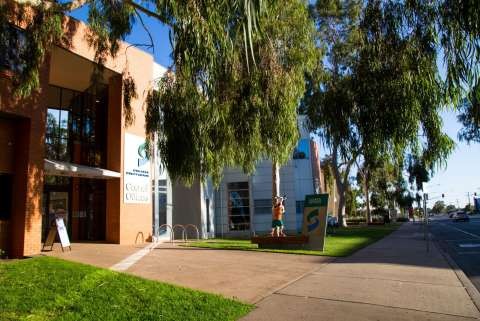The world is in love with Meredith Dairy’s creamy, velvety goat cheese. Despite a small marketing budget, the Victorian dairy has increased domestic sales by 5-30% over the past 32 years. International sales are just as pleasing. The company exports to Southeast Asia, the Middle East and North America and has seen sales increase across these markets.
Meredith Dairy’s biggest export market is the US. Sales doubled in 2021–22. Meredith Dairy’s cheese is sold in large corporation such as Costco through to small food stores. The company is now exploring opportunities in the US foodservice market.
Meredith Dairy is a vertically integrated enterprise, farming and growing food for dairy animals as well as manufacturing. Agriculture in the Western Victorian Volcanic Plains has many advantages, but the landscape is sensitive to impacts on soils, water and native biodiversity. Intensive farming and manufacturing require significant resources and energy.
Meredith Dairy’s growth, however, has not come at the expense of the environment. The company has integrated sustainability in every aspect of its operations. This includes renewable energy via solar panels and biofuel heat and power generation, water-saving initiatives, recycling, precision agriculture and land conservation.
‘Our farm is in a beautiful part of the world; we work hard to keep it that way,’ says Julie Cameron, Meredith Dairy’s co-founder. ‘The land has provided resources so that we can prosper and build a community. It is only natural that we invest and care for the environment.’
Renewable energy powers operations
Meredith Dairy uses around 2 MWh of electricity a day, and up to 3 times that amount for heating. The company’s manufacturing facility has 99kW-capacity of solar panels, solar-evacuated tubes for hot water and a biofuel boiler. The wood-gas generator converts waste timber into gas which then fuels a generator. This produces 70% of the company’s electricity demand.
‘Everything from the gasification process is used,’ says Dom Murphy, Environmental Co-ordinator/Engineer, Meredith Dairy. ‘The heat created from the gasification process is used to heat water. That means we can get our heat from waste timber and the sun.
‘The ash residue (bio char) is a very good soil ameliorant, so we use it on pastures and crops mixed with manure fertiliser. We are also trialling the ash residue to filter wastewater.’
Innovative clean energy initiatives have enabled Meredith Dairy to keep pace with growth and make savings. The biomass technologies have a payback of less than 4 years. The reduction in greenhouse gas emissions is approximately 600tCO2-e. Further renewable energy initiatives will help reach a net zero carbon target.
‘Every time there is a price rise in fossil fuels, the payback number gets better,’ says Murphy.
Landfill reduced by 80%
Contributing to a circular economy through recycling is another focus for Meredith Dairy. There are 26 waste streams recycled, including- wood, metal, plastics, oils and organic matter. This project has added value to most of the waste materials and has created employment opportunities.
‘Our recycling program helped us reduce landfill by around 80%, further reducing our environmental footprint and disposal costs,’ says Murphy.
Meredith Dairy is a member of the Australian Packaging Covenant Organisation (APCO) and is committed to the 2025 National Packaging Targets. The company’s dairy product packaging displays the official recycling logo (ARL), which encourages consumers to recycle, contributing to a circular economy.
Caring for the land
The Meredith Dairy property spans 2,200 hectares, on which cereal and fodder crops are grown and the dairy sheep and goats graze.
‘The cropping and pasture program incorporates Regenerative Agriculture (RA) principles to enhance soil health, protect water resources and biodiversity, and promote productivity and profitability,’ says Tim Johnston, Environmental Co-ordinator/Agriculture.
Soil sampling is undertaken annually across the farms to determine and correct soil fertility. This ensures optimum plant growth while minimising the potential of nutrient loss into waterways. Organic material is spread on paddocks to improve soil pH, replace nutrients and enhance the soil biome.
Minimum-till techniques are used to reduce soil disturbance and maintain soil cover. Sheep are integrated into the system to graze crop residues and cover crops and further fertilise soils. Improved plant varieties are an integral part of the cropping program (non-GMO). The use of precision agriculture techniques, such as GPS, enable crops to be sown into stubble from the previous season. This retains soil moisture and organic material and prevents erosion.
Land conservation
Co-founders Sandy and Julie Cameron are committed to conservation. They initiated a Conservation Covenant to protect for eternity significant landscapes on the property. Approximately 70 hectares of Meredith Dairy’s land is set aside for conservation, of which 30 hectares is classified as critically endangered ecosystems. These remnant areas are monitored and managed to promote the native biodiversity.
The conservation projects include:
- retaining all standing trees and fallen timber and branches for native fauna habitat
- ongoing management of weeds and animal pests
- ecological burning to manage grassy weed species and encourage native grasses and wildflowers to germinate and flourish.
Other areas not suitable for cropping or grazing are fenced off for tree planting.
‘We plant between 5,000 and 6,000 trees a year, some of these are mixed plantations to support biodiversity, others are fast-growing trees to sequestrate carbon or for timber and biofuel. Landscape restoration and revegetation projects have significantly increased the population of native flora and fauna, in particular threatened woodland birds, marsupials, and insects,’ says Julie.
More sustainability initiatives on the horizon
At Meredith Dairy, there is a long list of proposed environmental projects including further greenhouse gas reduction initiatives.
‘Any Australian businesses wanting to enact a sustainability program should just start. Even the smallest action can have a positive impact,’ says Murphy.
Go further, faster with Austrade
- Go to Austrade’s Go Global Toolkit to learn the export basics, find the right markets and understand market requirements





